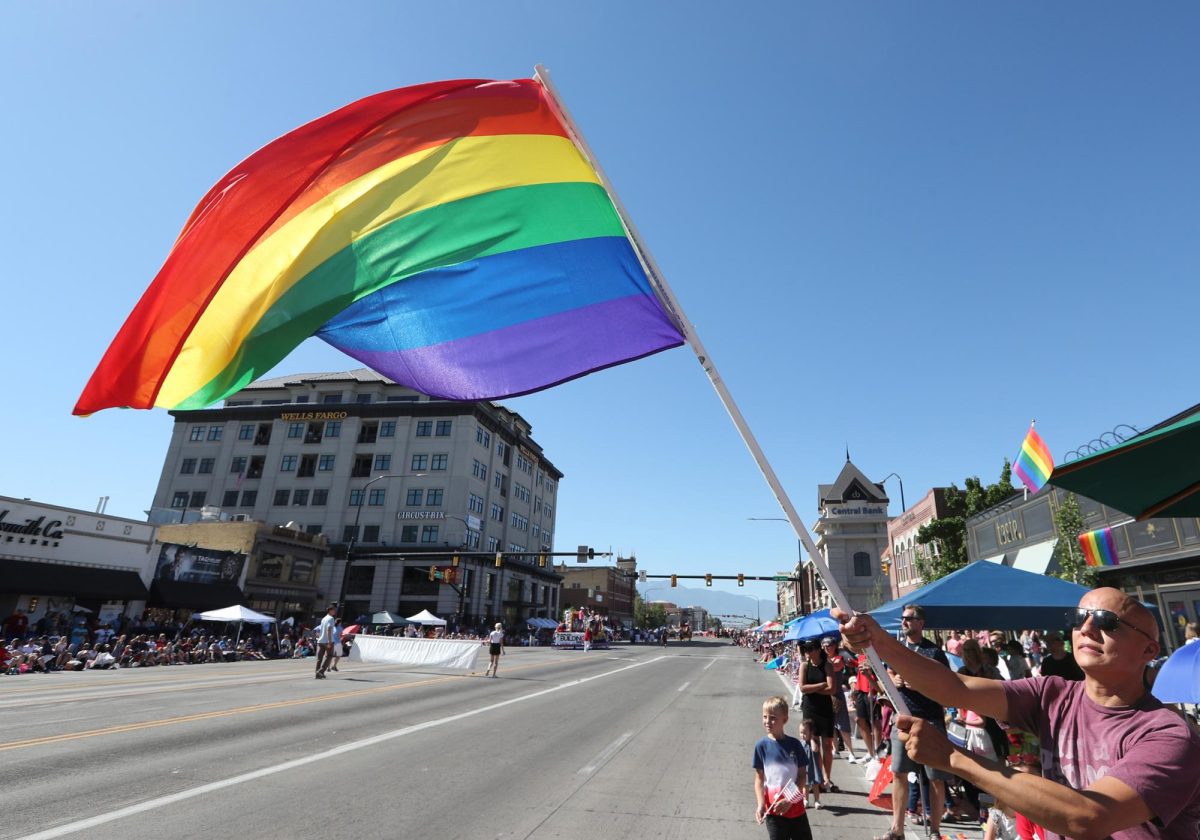Protestors set up in the Shepherd Union on the morning of Nov. 4 in response to the white supremacist posters put up in at least the Shepherd Union and the Student Services building on the morning of Nov. 1. The protest coincided with a Belonging on Campus event hosted by Assistant Vice President for Diversity and Chief Diversity Officer Adrienne Andrews.
The sit-in protest took place on the second floor in front of Einstein Bros with minority students and allies alike sitting together with signs and handouts. Terri Hughes, WSU NAACP chapter president, stated during the town hall that the sit in would last through the night.

Down the hall, Andrews’ conversation started with heightened emotions and many students shouting over Andrews as she tried to talk. University President Brad Mortensen, Public Safety Director Dane LeBlanc and Coordinator of Leadership Programs Sheldon Cheshire made their way to the town hall where they would answer questions the students had regarding the posters and campus safety for the next two hours. Campus police officers also made their way to the town hall as tensions seemed to escalate.
Students present for the town hall expressed their concern with not being alerted about the posters that had been put up and taken down before they had arrived that day. They were concerned that, despite the flyers not having an explicit violent message and being quickly dealt with, the flyers themselves could be indicative of violence against minority students on campus.

Cheshire told students about halfway through the townhall that he had been the one to take down the posters at around 7:30 a.m. on Nov. 1. He said he had canvased the building for an hour to make sure there were no other flyers that had been posted and didn’t see any others.
This is the third reported incident of white supremacist material being placed on the campus in the last three years, with the other two in 2018 and 2019. The Annual Crime Statistics do not list any hate crimes in those years.
Several students at the town hall mentioned two other incidents involving race in the last two years at WSU: the videos made about former WSU Debate coach and instructor Ryan Wash and former criminal justice professor Scott Senjo’s racist tweets during the Black Lives Matter protests in June of 2020.

In 2019, a student named Michael Moreno secretly recorded Wash during a class and posted edited audio on YouTube calling Wash “racist” and “anti-white” based on examples used during class lessons involving race and hypothetical debate strategies. Those videos are still available.
Wash eventually resigned from his position after him and his team were harassed and doxxed but attempted to rescind his resignation shortly after, but it was not accepted. Moreno left Weber shortly after as well.
Senjo tweeted several racist and threatening tweets regarding Black Lives Matter protestors and encouraged violence against them, including encouraging people to run them over. Senjo resigned, rescinded his resignation and resigned a second time between June and July of 2020.
Students pointed to these repeated instances of racism and bias as a deeper issue at WSU, both in the administration and in the student body. Every student who spoke said that they did not feel safe at WSU, whether it was because of their race, sexual orientation or gender identity. Staff members expressed their own feelings of doubt and danger when speaking up for students of color of faculty and staff concerns regarding race because of the loss of possible job security.

“I’m not blaming it on you or the faculty that are here right now, I’m blaming Weber State,” one international student said to Mortensen. “Why? Because these people work for Weber State. Who are they getting the yes from?”

Mortensen listened to the concerns of the students present and those they represented.
“It’s something we’re working on, and it shouldn’t be as hard as it is,” Mortensen said. “I pledge to do better.”

Students were not satisfied with that answer and pushed for more specific answers on how Weber would respond. Mortensen spoke about steps being taken and the University’s new Strategic Plan that was introduced this semester and the Diversity Advisory Board that is being set up.

“It’s going to be an iterative process,” Mortensen said. “But that’s what I’m here for. We’ll organize another event before the end of the semester and share a report on some of the actions that you talked about today.”
The sentiment from many of those who spoke after these comments was that it still wasn’t enough to make them feel safe, sharing their own stories of racism experienced on the campus from faculty members.
“I don’t want to be apart of that University,” Mortensen said. “I’m here to make sure it is not that way.”

A follow-up email was sent out at about 8 p.m. for those at the impromptu conference who signed up to begin the process to better notify students of events like this.
***This story may be updated.***



















